* You are viewing Posts Tagged ‘Networks’
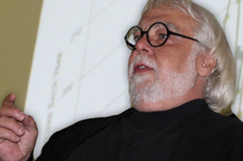
Professor Hatch during his talk.
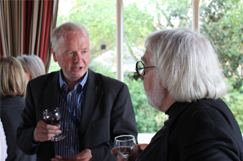
Discussions continue over wine.
In the opening paper of our second seminar series on Thursday 5 May, Professor Robert A. Hatch (University of Florida) got us off to a rousing start with a paper entitled ‘De-Centring the Big Picture: The Scientific Revolution and the Republic of Letters’. In a wide-ranging and suggestive analysis, Hatch argued that correspondence networks were the foremost facilitators of the new science in the early modern period (and vice versa), and for the creation and of vibrant intellectual communities around emergent fields such as astronomy. Compared to printed texts, suggested Hatch, letters were immediate and inclusive, situated the discussion of intellectual themes within the minutia of daily life, and were the primary medium for the gestation and discussion as well as the ultimate dissemination of scientific ideas in this period. The importance of scribal publication as an end in itself throughout the seventeenth century was further emphasized during discussion. Hatch illustrated his talk with a dazzling series of maps and graphs generated from his impressive personal database of scientific correspondences (which includes metadata on the letters of Peiresc, Gassendi, Bouilliau, and many other luminaries), although the necessity of combining quantitative exercises with qualitiative assessments of the formation of epistolary archives was underlined during a lively question and answer session. Seminars take place in the Faculty of History on George Street on Thursdays at 3pm. For future talks in the series, please see the seminar webpage.
James Brown
March 21, 2011
Conferences and Workshops, Events, Project Updates, Projects and Centres
Tags: CKCC, Digitization, Geography, Mapping the Republic of Letters, Networks, Spatial Theory, Union Catalogue, Visualization
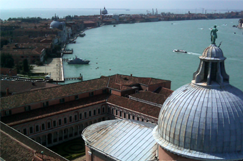
The Fondazione Giorgio Cini on San Giorgio Maggiore, with the island of Guidecca visible in the distance.
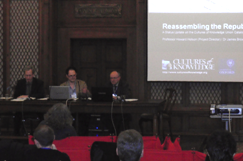
Our panel at the conference, shared with Charles van den Heuvel from CKCC (Huygens Institute).
Last week provided us with an opportunity to present the Project, specifically its union catalogue and associated editorial tools, at the international conference Mapping the Republic of Letters (Venice, 17–18 March 2011). Convened by the Stanford-based project of the same name (based at the Stanford Humanities Center), and held in and co-organised by the Fondazione Giorgio Cini on the island of San Giorgio Maggiore, the event showcased the work being undertaken by various individuals and projects worldwide to collate and represent digitally and spatially the early modern republic of letters. It also explored the research question of whether global exchanges of correspondences and other texts might be best conceived of as a state or as a network. While main sessions provided insights into the very wide range of approaches to this topic, associated meetings introduced the activities of the Milan-based research laboratory Density Design, and facilitated collaborative discussions amongst CofK, our hosts Mapping the Republic of Letters (Stanford), and CKCC (Huygens Institute), who also presented at the event. For further details, please see the conference webpage.
We will be presenting the Project at a wide range of correspondence-related events in 2011. For full details of our speaking schedule, please see the presentations page.
The 11th Bucharest-Princeton Seminar in Early Modern Philosophy, which will take place in Bran, Transylvania on 2–8 July 2011, is currently seeking contributions. Organised by the Research Centre for the Foundations of Modern Thought (FME) at the University of Bucharest in collaboration with the Philosophy Department at Princeton University, this year’s event takes as its theme Collaborative Aspects of Early Modern Thought: Philosophical Correspondence and the Republic of Letters. The deadline for the receipt of one-page abstracts and CVs is 27 April 2011. For submission instructions, as well as details of registration, costs, and keynote speakers, please visit the seminar webpage.
 A symposium on Early Modern Data Delivery will take place in the English Faculty of the University of Oxford on Monday 28 February 2011. The event will focus on letters as a manifestation of seventeenth-century information exchange, and will feature the following contributions:
A symposium on Early Modern Data Delivery will take place in the English Faculty of the University of Oxford on Monday 28 February 2011. The event will focus on letters as a manifestation of seventeenth-century information exchange, and will feature the following contributions:
- Johanna Harris (University of Exeter), ‘Obstinate Letters: Lady Brilliana Harley’s Defence of Brampton Bryan’
- Kate McLoughlin (Birkbeck, University of London), ‘Information Delivery in Shakespeare’s Macbeth and Stoppard’s Cahoot’s Macbeth: A Habermasian Reading’
- Katherine Duncan-Jones (University of Oxford), ‘A ‘Tragicall’ Letter (c. 1604): Writer, Recipient, Bearer’
The symposium will be held in Lecture Room 2 from 5pm.
James Brown
February 21, 2011
Project Updates, Publications, Websites and Databases
Tags: Bodleian Resources, Europe, France, History of Medicine, Martin Lister, Montpellier, Networks, Seventeenth Century
 In 1663, Martin Lister left his parents’ house in Burwell, Lincolnshire to study medicine in Montpellier. Whilst in France, he kept a journal in an almanac entitled Every Man’s Companion: Or, An useful Pocket-Book (MS Lister 19, Bodleian Library).
In 1663, Martin Lister left his parents’ house in Burwell, Lincolnshire to study medicine in Montpellier. Whilst in France, he kept a journal in an almanac entitled Every Man’s Companion: Or, An useful Pocket-Book (MS Lister 19, Bodleian Library).
Month by month, Lister noted the medical texts he consulted (and the French romances and comedies he read) in this thin octavo, and annotated the recipes given to him when he lodged with an apothecary. He described the personalities and works of luminaries he met in France including William Croone, Nicolas Steno, and John Ray. Lister performed a series of dissections with Steno, as well as going on natural history expeditions with Ray. Lister also attended the salon of Sir Thomas Crew to discuss ornithology, medicine, and literature, mixing with other fellows of Cambridge and English expatriates. As his time in Montpellier was part of his education as a gentleman, Lister made detailed notes about his visits to gardens and libraries in Paris, manufacturing methods, viniculture, literature and drama, and rules of politesse and art connoisseurship.
Dr Anna Marie Roos, our Lister Research Fellow, has recently been awarded a British Academy Small Research Grant to create a textual edition of the pocketbook with appropriate apparatus. To annotate the edition, she will also utilize 25 pages of memoirs of Lister’s time in Montpellier and 43 pieces of Lister’s French correspondence in the Bodleian Library and in France. As the account of Lister’s journey is so detailed, his grand tour and memoirs will also be recreated as an interactive website using maps, images, and texts, providing a virtual introduction to an early modern medical education.
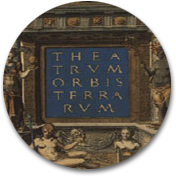 Further to the CFP (which is now closed), full details are now available for the conference The Global Dimensions of European Knowledge, 1450-1700, which will take place at Birkbeck, University of London on 24–25 June 2011. The conference will investigate the impact of European exploration and travel on the structures, contents and sources of authority of European knowledge c.1450-1700, seeking to explore connections between the making of knowledge and a broad range of intellectual, political, cultural, religious and mercantile encounters between Europe and the wider world. For keynotes, panels, abstracts, and speaker biographies, please visit the conference website.
Further to the CFP (which is now closed), full details are now available for the conference The Global Dimensions of European Knowledge, 1450-1700, which will take place at Birkbeck, University of London on 24–25 June 2011. The conference will investigate the impact of European exploration and travel on the structures, contents and sources of authority of European knowledge c.1450-1700, seeking to explore connections between the making of knowledge and a broad range of intellectual, political, cultural, religious and mercantile encounters between Europe and the wider world. For keynotes, panels, abstracts, and speaker biographies, please visit the conference website.





 A symposium on Early Modern Data Delivery will take place in the
A symposium on Early Modern Data Delivery will take place in the  In 1663,
In 1663,  Further to the
Further to the 
 Join
Join 